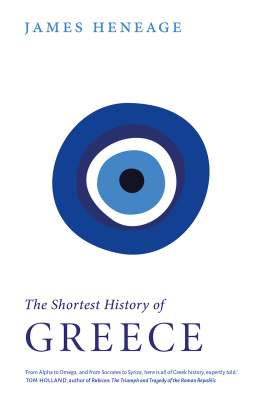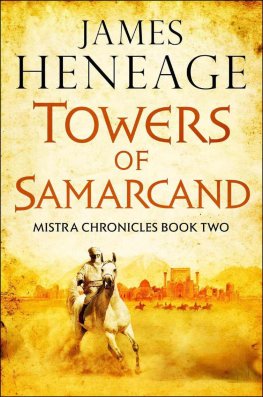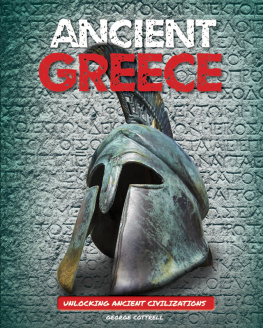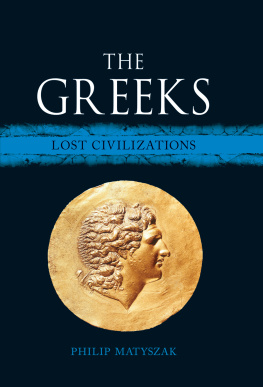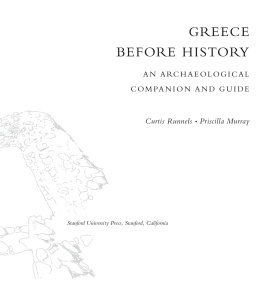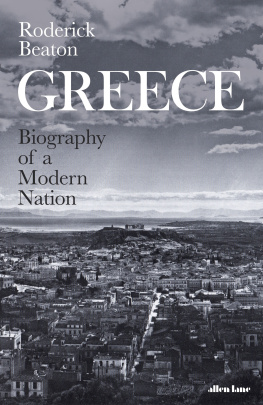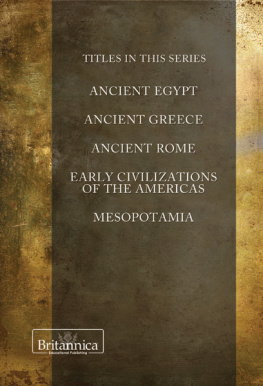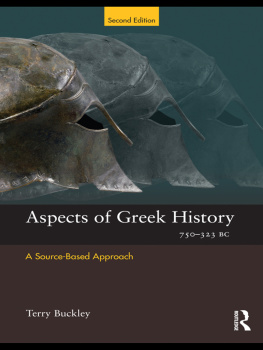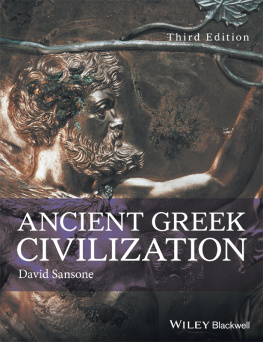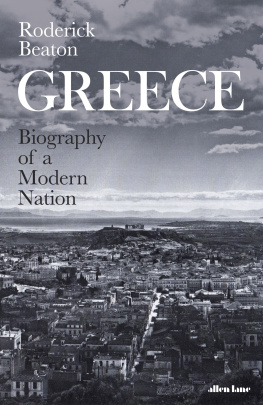PRAISE FOR
THE SHORTEST HISTORY OF GREECE
From Alpha to Omega, and from Socrates to Syriza, here is all of Greek history, expertly told, and at a pace that would have done credit to Pheidippides.
Tom Holland, author of Rubicon: The Triumph and Tragedy of the Roman Republic
James Heneage manages to race through more than 3 millennia of Greek history ancient, medieval and modern in fewer than 250 pages without racing by anything essential. The Shortest History of Greece is filled with illuminating vignettes.
Yannis Palaiologos, author of The 13th Labour of Hercules
A model of how to make the broad outlines of history accessible and digestible and never a boring paragraph, let alone a boring page.
Bruce Clark, author of Athens: City of Wisdom
In two centuries, from about 500 to 300 BCE, [the Greeks] extraordinary achievements in philosophy, literature, art and the organisation of society laid the foundations for the world we experience today Yet many of us continue to know little about Greek history. Heneage succeeds in rectifying that.
Daily Mail, History Book of the Year
ALSO BY JAMES HENEAGE
The Walls of Byzantium
The Towers of Samarkand
The Lion of Mistra
By Blood Divided
A World on Fire
Published by Black Inc.,
an imprint of Schwartz Books Pty Ltd
2224 Northumberland Street
Collingwood VIC 3066, Australia
www.blackincbooks.com
First published in Great Britain in 2021 by Old Street Publishing Ltd
Notaries House, Exeter EX1 1AJ
www.oldstreetpublishing.co.uk
Copyright James Heneage 2021
This edition published in Australia in 2022
James Heneage asserts his right to be known as the author of this work.
ALL RIGHTS RESERVED.
No part of this publication may be reproduced, stored in a retrieval system, or transmitted in any form by any means electronic, mechanical, photocopying, recording or otherwise without the prior consent of the publishers.
9781760643812 (paperback)
9781743822401 (ebook)

Cover design by Tristan Main
Text design and typesetting by James Nunn
Illustrations and maps James Nunn 2021
Cover photo by Zoonar GmbH / Alamy
Every effort has been made to secure permissions for all images reproduced in this volume. Please contact the publisher directly for further information.
To Georgia
Foreword
When, on his way to Thebes, Oedipus encountered the Sphinx, his answer to its riddle was: Man. That simple word destroyed the monster. We have many monsters to destroy. Let us think of the answer of Oedipus.
George Seferis, Nobel Prize acceptance speech, 1963
Long before history, Zeus sent a pair of eagles to fly around the world. Wherever they met would be its centre, and there an oracle would sit to pronounce on the affairs of men. Delphi was that place, not far to the west of Athens, and for a thousand years its oracle did just that.
The oracles main message was Know thyself. For Aristotle, that meant knowing that man was a social animal who without community became either beast or god. This insight underpinned a new idea about how men should govern themselves: demokratia. It was a good idea, so good that a vital part of it endured even after a devastating civil war had opened the door for tyranny to return. Demokratia, it seemed, didnt only bring purpose to lives, but also beauty and meaning. It empowered men (only men at that time) not just to govern themselves but to create great art and science too.
Wherever Greeks went, the idea of human empowerment went with them, and they travelled far and wide. So Alexander the Greats empire became Greek, just as the Roman Empire became the Greek one that saved Europe from conquest. The Renaissance courts of Northern Italy drew inspiration from the Greeks, as did the philosophes of the European Enlightenment.
The West owes its civilisation to the Greeks. Its a debt we often tell ourselves we have repaid: by supporting Greeces struggle for independence and the nations expansion in the nineteenth century; her stand against Nazi tyranny, postwar boom and joining of the European Union in the twentieth. But this support has seldom been disinterested, and it has sometimes come at great cost to the Greek people. After the Second World War, Britain and America helped bring about a civil war whose legacy was half a century of political turmoil and the worst financial crisis ever endured by an advanced economy. The harsh terms that were attached to Greeces rescue from that crisis suggest that Europe now considers its debt fully settled.
It isnt. Over the coming decades, our democracy will be tested as never before. In its current guise it is unlikely to survive. I have written this book because I believe that the story of the Greeks ancient, modern and contemporary can help us reinvent it.
PART ONE
RULING HALF THE WORLD
(Beginnings1453)
THE HOMERIC AGE
These things never happened, but are always
Sallust, Roman philosopher, 4th century CE
It is 1000 BCE and you are sitting beneath a wall made of stones only giants could have lifted. Thunder and lightning rend the night and a bitter wind scatters sparks from the fire that warms you. You shiver and wonder. Who built this wall I sit beneath? What makes the thunder? How did I learn to make this fire? To whom or what do I owe the beauty and misery of my existence? Someone sits down beside you. He is the travelling bard, and he has the answers. Through the night he will recite them in poetry that you know almost by heart.
Hell talk of Chaos that came before everything, then the first incestuous coupling that brought forth the world. How Gaia (Earth) and her son Uranus (Sky), gave birth to twelve Titans six males and six females plus a race of one-eyed Cyclopses and some giants, each with a hundred hands. It was they who built the wall with its huge stones.
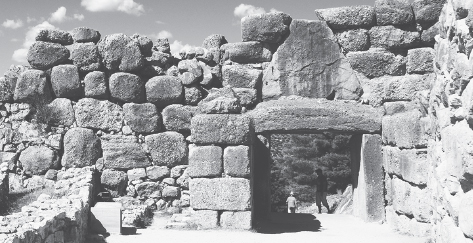
The work of giants: Cyclopean stones at Mycenae
One of the Titans, Cronus, rebelled against his father and castrated him, then married his own sister, Rhea, by whom he had the first generation of Greek gods. But Cronus kept eating his offspring, fearing a repeat of what hed done to his father. So Rhea spirited away her new-born Zeus, giving her husband a wrapped stone to swallow instead. Zeus came back with a potion that made Cronus vomit up the stone along with all his siblings. He banished his father and, true to tradition, took his sister Hera for wife.
Eventually, after battling it out with the Titans, Zeus and Hera came to rule over ten senior gods on Mount Olympus. There they consumed nectar and ambrosia and interfered in the affairs of mankind, not always to its benefit. It was Prometheus, a Titan not a god, who gave us fire. Zeus was so angry that he chained him to a rock, his liver to be daily pecked out by an eagle.
Next was a time of mortal heroes. Most were men and most had a god for parent. Perseus, Oedipus, Jason and Theseus battled with giants, sphinxes, gorgons and dragons to make the world safe for humans. Prometheus was eventually set free from his chains by the greatest hero of them all: Heracles.
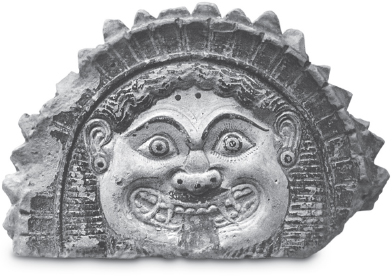
Next page
